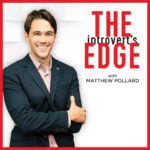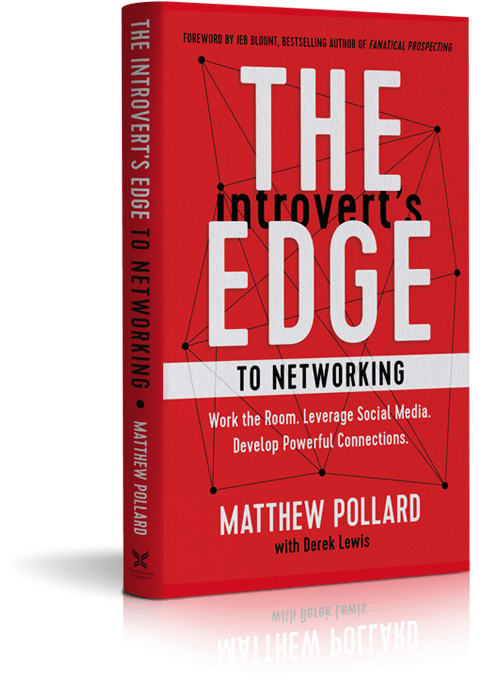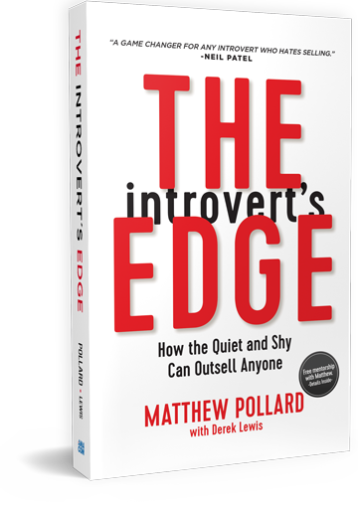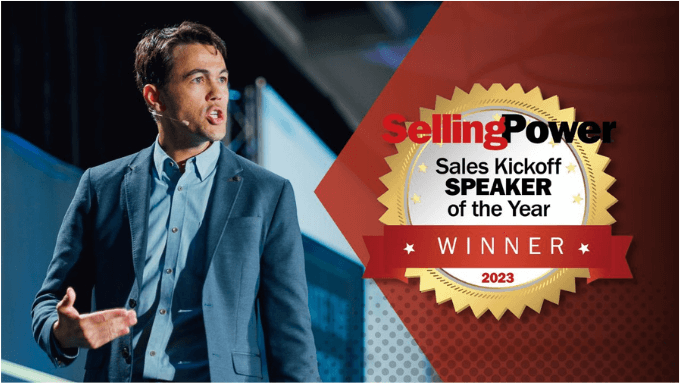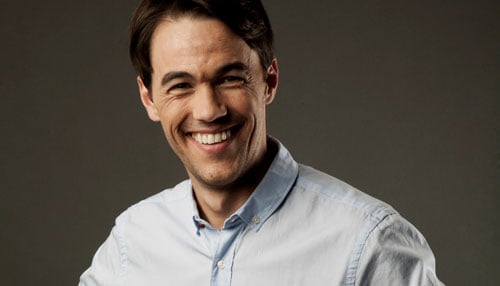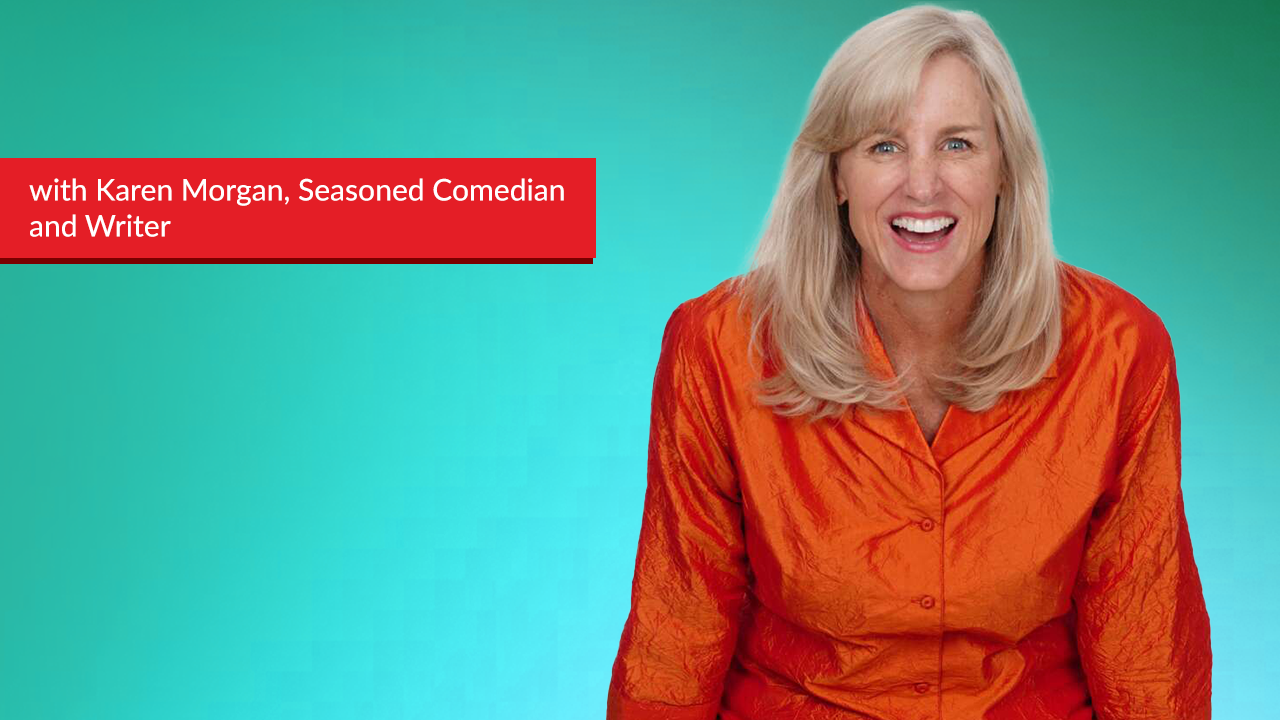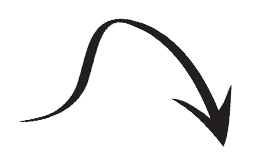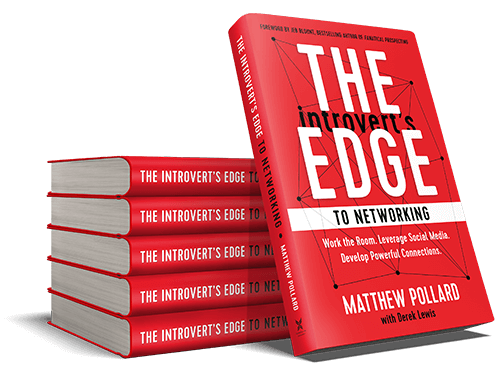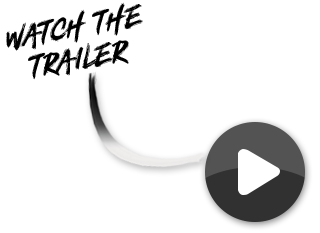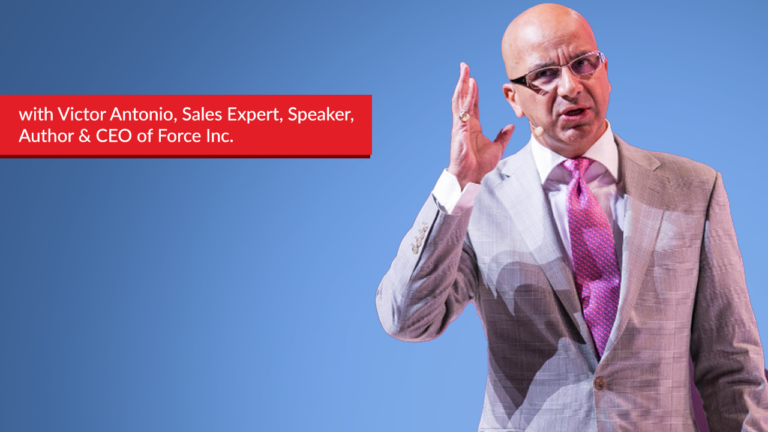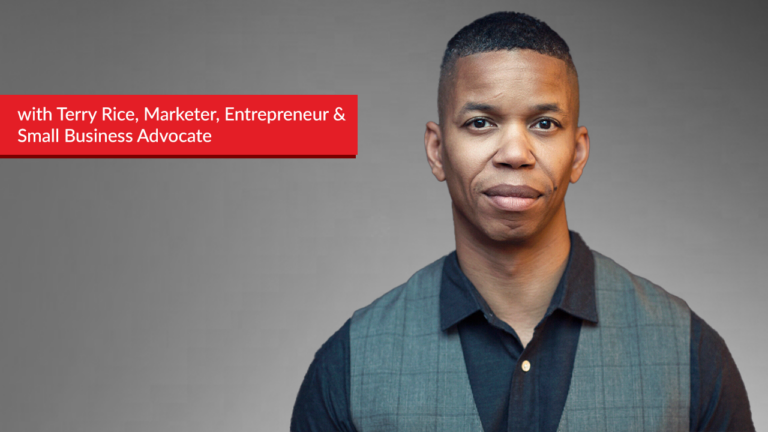Matthew Pollard: Hello, everyone, and welcome back to the Introverts Edge podcast. I’m ecstatic to have our next guest with us. And I have to admit, this is a curveball to most people. I bet that they’re going to be listening. But Karen Morgan is actually a comedian. She was discovered on Nickelodeon’s Search for the funniest mom in America. She’s got nearly 200,000 followers on on Instagram.
She’s got a post literally about introversion that went viral and she speaks all over the US. But funnily enough, she was actually an attorney in her early life, which so I feel like this is going to be a really interesting interview and I’m looking forward to getting into it. Karen, thank you so much for joining me.
Karen Morgan: Well, Matthew, thank you for having me. I’m glad to be here.
Matthew Pollard: Now, you and I, I mean, we spoke quite considerably beforehand because I kind of said to people, like I said to you, that no one’s going to believe you’re introvert. I mean, you are on stage doing comedy, which I mean, just between me and you, I can’t think of anything worse for someone like me. So, you know, I speak from stage, but I you know, I it’s funny.
And you tend to guide yourself in some similar ways to me, and I can’t wait to get into that. But I. I really want you to help people believe that this person that I’m looking at, that just seems so calm being on camera right now. And also that speaks from stage. Help me understand this introverted journey that you had.
Did you realize at a certain point you’re introverted or you always know and and kind of what led you to where you are today?
Karen Morgan: Well, I, I think I’ve always known it, but I don’t think we have. In the past, when I was in high school and college called it, I think we identified it a little bit better. Now these days, you know, you can, you know, I dunno, I follow different inner introvert podcast and different introvert Instagram accounts and that sort of thing.
Back in the day, nobody really called it that. They called it shy or they called it, you know, something, something different. So I’ve embraced it and it does as a, as a standup comic, people I do get comments all the time, including on that viral video. There’s no way you can be an introvert. You know, you’re a stand up comic.
Stand up comics can’t be introverted. Well, they can. I am one of my favorite comics who’s a brilliant Steven Wright. He’s very introverted, He’s a good friend, and he’s really an introverted person. It it doesn’t matter what line of work you in. Introverts are everywhere. Everybody’s doing a lot of different, different jobs.
Matthew Pollard: I think that’s really important for for people to hear because I, I agree with you. I think that introverts can do everything, as a matter of fact, and will get into this. I believe that introverts actually have an advantage because of the fact that they find things slightly difficult, perhaps at the beginning. But I think that a lot of people do that think they’re shy when they’re actually introverted and they’re totally, totally different things.
I, I guess one of the things that I would I would ask, though, is, I mean, how did you find your way into comedy and did did that was that an issue for you? Because you felt introverted, like that was a barrier to entry for you? Or did did you just blow past it like what happened there?
Karen Morgan: Well, I have to start out with the caveat that I didn’t start doing standup until I was 40. I also was a mother of three small children, so there became a little bit of a having been a mom to two children. The fear of other things is not as big anymore as if you’re already a mom. So how how bad can this be?
I think I threw it at the wall like, how bad could this be? I’ve already had three kids, so and that which also led to sort of my comedy material, why I got into comedy. But going back to when I was practicing law and was a trial attorney, I think I felt the introversion a little bit more. My my biggest fear in the courtroom was looking foolish.
I think that was my my top fear of all time was I was getting up in front of a jury and or a judge and arguing, you know, cases and that sort of thing. And I my biggest thing was I didn’t want to look foolish. So I went. That was my fear. So I overprepared every case. I overprepared every argument.
So then when I got to doing standup comedy, which in a way is harder than practicing law and people don’t understand this either, I just I kind of approached it as a very preparedness sort of way. Like if I’m prepared before I go on stage, I can take away some of that anxiety that I would have otherwise.
Matthew Pollard: Yeah, that that’s really interesting. And I think that a lot of people feel that actually I’ve seen a lot of those trial attorney TV shows where, I mean, I know they blow that out of proportion, but these those people seem to be just dynamic. They just get up with very little preparation and they just they do it. And I think people think that about sales and public speakers.
And if somebody is doing that, they must just have that natural ability. And it sounds like you’ve protected yourself through huge amounts of planning and preparation to make sure that when you were on stage that while there was no, shall I say, when you’re in the courtroom, while there was things that were outside your control, in a lot of ways you controlled most of the variables so that it was likely going to fall within this kind of space as opposed to such a broad thing that was uncontrollable.
Karen Morgan: Yeah, that’s very true. And I always tell young comics, you know, control what you can, and the number one thing you can control is how prepared you are and that and that’s for any job, quite honestly. That doesn’t just that’s not standup comedy or practicing law, but you can control how prepared you are, how rested you are. Have you shown up on time to the meeting or are you late?
And that’s adding anxiety. So I tell young comics, show up early, bring your own snack, you know, bring your own bottle of water, don’t show up and expect other things. Other people to help you with stuffs control what you can. And that takes away as much of it as you can. There are certain things you can’t control. You can’t control if there’s a drunk person in the audience or you can’t control, or if the you know, if it’s hot in the room, there are certain things you cannot control but control what you can.
And the majority of that is in your is in your purview. You can do it.
Matthew Pollard: Interesting. Well, so I’m I’m interested to find out about your energy levels like on stage and after after speaking on stage and the reason for that is I found myself, like when I didn’t do as much planning and preparation or even when I didn’t know how to do that successfully, there was a lot of energy wasted. And I’m saying wasted because it was catastrophizing and ruminating on what was going to go wrong.
And then when I got on stage, I found myself being super energetic and actually enjoying myself after a while. But then over time, like I could answer questions and then I would sit down and I kind of felt like I’ve been skydiving, right? Like that energy level is just gone off. Like, have you felt because you speak all over America and you’re in multiple places all the time and it it seems like your agenda is, is very energetic and I mean, I know you will work on your fitness.
Like, does that play a part of it? Like, have you found that? Do you find a similar thing with your energy or is it different for you?
Karen Morgan: Well, I think I call it protecting the creative energy. I have to protect my energy. So if I’m on stage, as you said, you get a little kick, you get some adrenaline, you get it going. But then I find after the show, I’m going to go back to my hotel room and like literally watch TV and protect myself.
I also protect my energy leading up to it. And so I try not to I try to take a nap before a show. I try to sit quietly in my hotel room. I’m certainly not going to go out to dinner with people before. A lot of times I’ll do shows and they’ll say, Hey, would you come to dinner with us before the show?
We love to, you know, and I know that that will suck out my energy. My social battery will will suck out before I even in performing. So I do have to be super protective of my creative energy and my performance. I call it performance energy. And, you know, I’ve only got enough room, so many minutes of that in a day.
So as opposed to people who are extroverted and they’re on show all the time, and I think that they get energy from interacting with people, whether as for me, I find sometimes and not in a bad way, but other people will suck out my energy, so I have to be protective of it.
Matthew Pollard: Yeah, absolutely. And I, I think that’s a really important thing that, I mean, there’s nothing wrong with that, right? Like it. You need to understand your energy. And I have people like it’s so weird. Like, people always want to ask me questions just before I go up on stage. And so I have I have to tell people to take me from that because for 5 minutes, 10 minutes, I’m just rehearsing my first line over and over and over again.
That’s the part that’s uncomfortable. And then we’re going to get into I can do storytelling and I tell a story from stage so that I mean, the science behind that is it actually activates the reticular activating system of the brains of the listeners and the teller. I feel automatically comfortable and I know that you tell a ton of stories yourself.
And you know, it’s interesting because a lot of introverts think that they’re not funny and they have this thing called dry humor. They’ll say, which is why they keep it only for their family and friends. Yet you’ve kind of made a career out of dry humor not being that kind of set up with Punchline, but more that storytelling kind of focus.
So I was like, I knew this was going to be a good interview because you literally think the exact same way I do. You just doing it? I don’t even know it could be done in that kind of comedy framework. So I’d love for you to share with people a little bit about kind of the way you think through your set, because I feel like you keep telling you, you keep telling me it’s it’s actually more about the behind what happens on stage and the planning and the preparation and the writing and to create these great stories so that I don’t have to be dynamic on stage.
So I’d love for you to kind of share a little bit more about that.
Karen Morgan: So when I do a set, so right now I will. I’m doing about an hour, so it’s an hour with the material and it’s in comedy. We call it a set list. So it’s basically a bullet point list. And I’m going chronological in my set list in my head, but it’s got to be in my head before I get on stage.
Now, some comics work off the fly. They do crowd work and they’re going off their set list. I’m pretty prepared. But, you know, looking at comics that are very prepared, sounds like they’ve just they’ve just thought of it, right? But they’ve actually been working on it for for some time. I want to go back quickly as you talk about people talking to you before you get on stage and how you need to act.
There’s something in comedy. There’s there’s the green room where all the comics are backstage page. And what tends to happen in the green room sometimes is that comics are one upping each other. They’re trying to be funny for each other and they’re trying to. And I find it so draining. And I and I try not to I don’t want people to think I’m rude, but I physically can’t be around that that energy before I go on stage.
It’s going to mess me up. So I will go. I’ll find a corner and get a Coke to drink and hang out by myself in a little quiet area because I find that that’s a social drain for me before before I go on stage. Because when you get on stage, you know this, Matthew, that you’ve got to you’re going to tell a story.
It’s got to be a beginning, middle and end. You’ve you’ve got to get through it. You’ve got to hit your your highlights. And as you’re going through it, you do get energized because the the audience is with you. You see the nods and you’re so they they give you energy. And I think this is one thing that I was missing.
I did a lot of Zoom shows during the pandemic, and some of the Zoom shows had volume and some of them didn’t. I couldn’t hear. The people were laughing. I couldn’t hear. I could barely see faces. And it’s it was so draining to me because when you’re in front of a live audience, those people give you energy back.
So whether you’re introverted or extroverted, you need that that energy exchange from from the live audience.
Matthew Pollard: That’s interesting. I, I have a quick question on this is not to do with introversion. I’m just interested is so I had to speak virtually as well during that COVID COVID period. Did you learn anything during that period? Like did you become a better comedian during that period? Was did you find that when you came back you were less good?
Would it drained your energy more like, help me understand that.
Karen Morgan: My my expression is a little bit different. I did not find that it made me a better standup. In fact, it it didn’t help me at all because the the medium from which we were working in a camera, like we’re like our talking today was very different than being in a theater or a hall or whatever with a lot of people.
What what was great for me during pandemic was I learned to create content in my office or in my yard or in my home, which was just me and a camera. I started doing these voiceovers that the voiceover things were great because I was voicing my voice over another video, this lady that was doing cooking, and she’s a British cook, and I was giving her a Southern voice and I just did it because I was bored.
But what I found was, Oh, this is great because as an introvert, I don’t even have to be on camera, you know, It’s so it gave me a whole new set of content that I was not prepared for. So I learned that in terms of what did I learned through the pandemic, I learned I don’t like Zoom shows and I don’t and I and I do like voiceover work.
And I did one I did one Zoom show that was in webinar mode. So I couldn’t even see faces. I could hear nothing. It was like me talking to my wall in my office for an hour. And I remember I left my office and went my kitchen and lay down on the floor and just lay there for like 30 minutes because it was I was so drained at that point.
Matthew Pollard: Yeah, that makes sense. I mean, you basically just giving energy and getting nothing back for for an hour. And like, I understand like, I know my stories and I know how people respond to them. So and I’ve done it for so long that I, I actually don’t mind them being over camera. And I actually got better at the craft, Like I found like I became more emotive and I had to be more focused on where I was standing.
So I’d move from this camera to that camera. But in something like comedy where you don’t know whether they’re responding well or not, Yeah, I can imagine that Would that would that would be tough. I yeah, I am excited about what you said though, because what I what I heard I mean, you’ve had you’ve had viral videos, but your viral videos were, you know, kind of ah, after some of these initial works that you did when COVID first happened and I always wonder whether or not it would have happened without that initial work.
And I doubt it. But what I’m what I am excited about is what I heard with everybody is kind of one upping each other in the green room. I go and find my own place. Yes, I during COVID, realized that this part I couldn’t stand, but this part worked for me. What I’m seeing is somebody that is making decisions about how to engage in the career that they’re in.
Is there a way that you mentally do that you like stumbling into that, or are you making these decisions and being more methodical about how you manage your energy?
Karen Morgan: I think I have become more aware of it, of of saying to myself, hey, I need to protect this, this energy. And I have a woman that I consult with and she I met her during during COVID. She was on tech talk and I was trying to learn Tik Tok. So I met her in this Facebook group and she and I have become friends and I talked to her now.
And one of the things I’ve learned from her is, you know, recognize that you need to take the time away to protect that energy, whatever it takes, whether it’s go for a walk. I’m a swimmer. I’ll go for a swim. It’s I love swimming because no one can talk to me. So, you know, go for my text. Take whatever you need to do to protect your energy.
So then when the time comes that you need to have performance energy or creative energy in order to write, you’ve got that battery sort of reset. So but I have become more aware of it, recognizing that, hey, it’s okay for me to go just take a walk right now. It’s okay to get up for my desk and go walk around because this is actually in the long run helping the overall process.
Matthew Pollard: I think that’s important. I mean, a lot of people feel guilty about walking away from the desk or they would feel guilty about not being part of that banter in the green room.
Karen Morgan: Oh, yeah.
Matthew Pollard: How do you like like, do you do you feel guilty when when these things happen or have you found a way to give yourself permission? That that’s okay?
Karen Morgan: I think in terms of it like a green room setting, I feel guilty because I don’t want people to think that I am being aloof or rude or or, you know, or arrogant or whatever when it’s just I, I can engage with that. I just physically can engage with that. So I don’t because I probably because I’m introverted, I don’t hold up a sign and said I’m I’m going to my safe space over here.
I like you all. I love you all, but I’m going to go sit over here now to protect my I don’t I just sort of quietly disappear. And I think we’re all introverts. We’re good at that. We’re good at quietly disappearing. And I think if we can recognize why we are quietly disappearing and and also know that it’s okay to quietly disappear for that reason, just give ourselves a break.
You just have to don’t don’t don’t feel guilty about it. Like I said, I just want people to think I’m being rude. That’s my only thing.
Matthew Pollard: I think that the message is powerful because there are people that are listening to this that perhaps don’t give themselves that permission because they feel like they have to, but then they don’t perform in that moment that it’s necessary. I mean, if you were engaging in that banter in the green room and then were terrible on stage, then you wouldn’t be accepted by that group anyway and they wouldn’t invite you back and the audience wouldn’t like you.
So it’s about really being the best at that time. And what’s interesting is I always used to feel bad about it. And then I used I started making this joke about and again, everything with me has to have a script and a process, right? Because otherwise I’m not going to feel comfortable doing it. I used to say to people now for about 5 minutes before my presentation, I’m going to walk away because I need to I need to rotate the same line in my head to feel comfortable, because until I get into the story, I’m super uncomfortable.
But I don’t want you to think it’s this introvert that’s just run away and then not coming back. I promise I will do that. And everybody laughs and it made me instantly feel comfortable and I got better, better at telling it that way. And then I yeah, it made such a difference to the. Why did you ever find yourself, like, not using your introversion as an excuse in place if you, if you do like, feel free to share that, but you’re more so explaining it maybe to family members, to friends, so that they understand that what you’re doing isn’t walking away from them because you’re being mean to them.
But just because this is your process or something that you need. Right?
Karen Morgan: I tend to probably say it to my family more really close people. I don’t tell strangers I’m going to do X, Y, Z because I’m introverted. I feel like that that’s like almost too much for like that’s almost too much of a hurdle for me to take. But, you know, my husband knows when we’re at a party or whatever, when I’m done, you know, and I’m just like, time to go, you know, he knows me well enough.
My kids know me well enough to know that I will say no to different invitations, social invitations, because I just I just can’t. There’s also we talked earlier about sometimes I will do nonprofit fundraising shows and generally those things are also corporate events. They’ll have a dinner before I speak, and probably you have had this as well. Before you speak, there’s a dinner and you’re after dinner speaker and they always want me to come and dinner and I just can’t do it.
And so I just generally say, Thank you so much, but I’m going to need to prepare. I don’t go into any details, but the reality is, if I’m having to talk to someone at a nice table and kind of, you know, socialize before I’m even speaking, my energy level is going to go down a little bit. So, you know, I don’t say all the words, but that’s what I’m doing.
Matthew Pollard: Yeah, I think saying you need to prepare makes perfect sense as well. Like what it’s saying is I’m not going to have an enjoyment time with you because I’m, I’m, I’m doing the work and I feel like people can never get upset with that.
Karen Morgan: Yeah. Yeah.
Matthew Pollard: What I am interested in, though, because I mean, you talk about not doing so kind of set up comedy and you talk about preparing stories and what I think is going to shock a lot of people is you kind of share that A lot of the success that you have is more about the writing than the being on stage.
Karen Morgan: Oh yeah, yeah.
Matthew Pollard: I would assume most extroverts would struggle with that. That’s maybe that’s why they do the most stand up and just read the room kind of stuff. But you really leaned into your strengths. They’re like, Help me understand that. Because, I mean, one of the questions that I ask all the time is, you know, what do you consider your introverts edge?
And I feel that, you know, this this answer is going to come up as a response to this question. So, you know, help help people kind of understand that, you know, the planning and preparation that comes in to that kind of feeling almost dynamic on stage.
Karen Morgan: Right. So my writing process and I’ve now been doing comedy longer than I practice law. So and I’m and I will continue to do this forever because I am enamored with the writing process of comedy. I just love it. I love the wordsmithing, I love working out different things. But when I start writing what will eventually be a bit on stage, it is generally something I’ve observed or I’ve experienced.
And so I’ll make a note or two or in the airport this happened or what? You know, or my husband did this and I said that some things like that. I’ll keep a note of it and then I’ll gradually, you know, work on it until it becomes something on stage. But these this is weeks, months and sometimes years before it is finally, too, the way it’s done at a full on show.
And so the process for me as an I’m generally an observational comic is kind of quietly blending into the woodwork and observing people. I you know, when I’m traveling, I’m not loud. I, I have stops telling people on planes what I do because generally they’re disappointed and, you know, and then the people who know me, they say, oh, are you are you the comedian?
And I’ll say, Yes, but, you know, I’m not funny in real life. And, you know, because they they expect they expect something, you know, they expect some sort of, you know, extroverted behavior. So I have to people are constantly disappointed in me in real life because I’m not I’m a little different. I’m just quieter. But when I’m when I’m traveling or if I’m observing or if I’m taking notes on something, it’s going to eventually be a bit I am getting gritty details, you know, as a quiet observer, you can get a lot of details when people don’t think you’re listening to them, which is kind of fun.
Matthew Pollard: Yeah, I agree with that. I do a lot of silent observing myself, and I agree it makes for some great antidotes that, you know, you can kind of practice over time. I think that what of what I’m really interested in and look, I’m excited that you’re coming on the introverted seller Summit as well because I want to go deeper into this topic and I think we could do a whole interview on you because I talk about storytelling and how most people tell stories off the cuff and my stories that I tell in businesses.
So, you know, I’ve really thought them through and I’ve worked out what things people really enjoy and what people don’t and how to remove things and embellish on certain things to make them kind of theatrical masterpieces. Right? So and I think what I’m hearing is that you’re applying that exact same strategy to the art of comedy because you’re doing the same thing.
You’re iterating and iterating the same story as opposed because you’re doing it in different places. You’re doing it with different customers. And I really want to go deeper into that because I think for the for the introverted sellers that are listening and by the way, if you’re a small business listening, if you’re like, I think it was Peter Thiel that said if you if your business consists of just you and your laptop, look around, if you don’t see any sales people, you’re the salesperson, right?
Karen Morgan: And that’s you.
Matthew Pollard: Exactly right. So for a lot of people listening, if you think that you’re not an introvert, it’s you. You’re wrong, you’re introverted, seller in denial, perhaps, but you’re definitely introverted, sellout. So, you know, and for those people who haven’t registered yet, it’s and hopefully it hasn’t passed, but it’s on October nine and if you know you’re listening to this years later, you know it’ll be in the introverted introvert you platform so you know, it’ll be available to watch there.
But you know, it’s all free. So feel free to come and check that out at the introverted telecom. But I’m going to ask one last question because I really I’m tired of people talking about introversion is a disadvantage because I believe it’s like the reason I’m successful. And so I’m going to ask you to just the straight out question, like what do you consider your introverts edge?
Karen Morgan: I think my my introverts edge is the ability to observe and to keenly observe life on an on a daily basis. Because I think if you’re if you’re on all the time and you’re you’re you’re being the show all the time, no matter what business you’re in, if you’re if you’re on all the time, you’re going to miss some subtle things that are happening around you with other people.
But I find that to be an advantage because I am I’m introverted and I’m observing and the observations in terms of my business in comedy is that the more detailed, you know, descriptions you can give of certain events, the funnier it is because people relate to it more. You give a really specific, detailed description of what’s going on, whether it’s a, a, a human experience or just something that happens day to day.
So I find that the ability to be a detailed observer as an introvert is my my introverts edge.
Matthew Pollard: Look, I think that’s really powerful for people to hear and a very different answer than a lot of people have said. I, I find the same. I mean, even in business, I see people that financial control is trying to inspire people around a KPI. Nobody cares, but if they observed one person, there was a customer that had a problem.
And I can tell that, well, everybody can get behind that. And in sales, telling one story of one person that was struggling and their experience and their outcome, it’s the details of the story that are about that person’s human experience that makes the difference. Not that the product was great and it worked. No one cares. And so I feel like most people would see that silent observer is a bad thing, right?
I’m not part of it. And you’re really saying, Well, actually, no, not being part of it means that I can leverage it in the future. And I think that’s that’s really, really powerful. Counsel for people that have never heard of you before, which, you know, is a lot harder now than it was, you know, a few months ago, that people that have never heard of you before, like, where would you suggest people I know you do shows all over America and things like that as well.
Where would you where would you suggest people start? Is it your Instagram, your website? Where would they go?
Karen Morgan: If you go to my Instagram, which I mean, my my website is Karen Morgan dot com and that’s got all the socials there and if you go to Instagram or any of the socials, it’s Karen Morgan comedy. But it’s funny, as an introverted person, I even have trouble saying, find me here, you know, But that’s where you can find me is generally Karen Morgan dot com.
Matthew Pollard: Yeah well you’ll find it because when you search her name she’s the only caramel. Good comedy will show up obviously. But also it’s the one with 185,000 followers. So you know for those people that you know because people are forever borrowing people’s profile, photos and identities don’t go through the one that if they find one that’s a little bit less.
But, you know, I would really recommend people check it out. She is your message. If you enjoy laughing at your introversion, you’ll you’ll get a you’ll get a kick out of it. And I think we all need to write because when you have an advantage, then you are allowed to lean into it. Like if you see it as a disadvantage, you might not find it that funny.
But if you see it as a true advantage, which I really hope at this point in this podcast, you’re starting to feel that way, you know, definitely, definitely check it out. But Karen, thank you so much for for joining us today.
Karen Morgan: My pleasure. I’m so happy to be here. Thanks.
Matthew Pollard: Now, for those people that are enjoying today’s episode, please make sure you take a second to to post a review. Please take a second to subscribe because we’ve got some other amazing interviews that are coming out. And if you’re listening to this before October 9th of 2023, make sure you go to the introverted seller Summit because you’re going to get the opportunity to see part two of Karen’s interview, where we are going to be talking about some really, I think, interesting things about going deeper into the detail of story as well as some of the advice she gives to new comics that go on stage.
And I think it’s going to be critical for perhaps those new sellers that all pre-established sellers that perhaps feel a little bit of anxiety around the sales process. So we’ll see you there. But for today, thank you so much for joining us and we look forward to seeing you in the next episode. Cheers.





